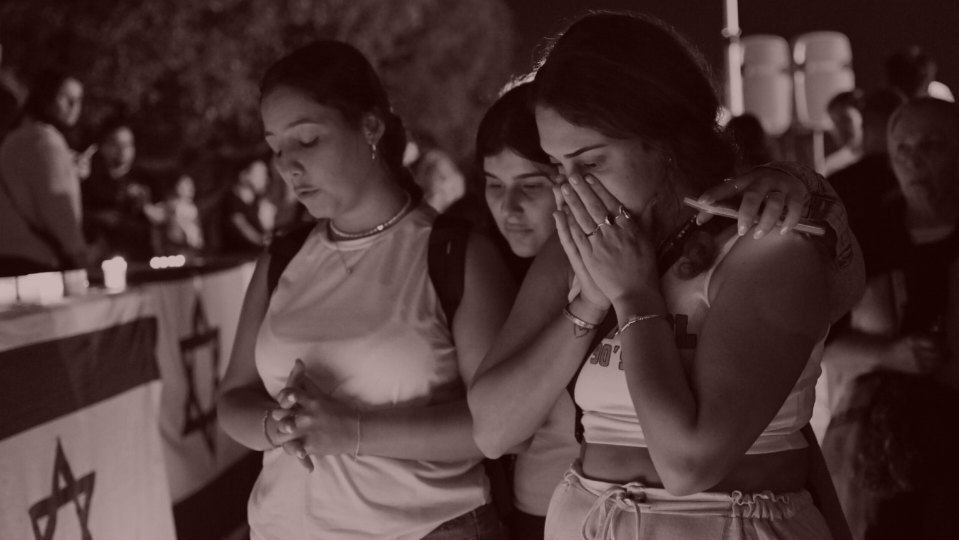 |
 |
|
Hello, and welcome back to The Best & The Brightest, though I almost wrote “Tomorrow Will Be Worse”—the name of my old column—because every tomorrow since Saturday has been worse than the last.
As of this writing, over 1,000 Israelis and over 800 Palestinians have been killed, with thousands and thousands more wounded on both sides. At least 14 Americans are dead and more are being held hostage by Hamas. Israel is pummeling Gaza and preparing an apparent ground offensive, telling Palestinians to leave, a grotesque demand because they are locked in and have nowhere to go. Israeli reservists are mobilizing for war while Israeli parents, unsure if their children are dead or alive, plead for any information on them, and Palestinian parents try to rescue their children from under the rubble of their ruined homes. And I’m bracing myself for what will continue to come in the next days and weeks: death, death, and more death.
And so, tonight, instead of the reporting I had planned, I wanted to share a personal note. But first, a few quick updates from my partner Abby Livingston in Washington. As Abby notes below, the sudden war in Israel is having an effect inside Capitol Hill, where it’s overshadowing a chaotic speaker race—one whose outcome will have an impact on the U.S. response, too.
|
| Speaker’s Race Ripples & Israel Impacts |
|
| It’s a testament to the horror unfolding in Israel that the chaotic House speakership battle has temporarily disappeared into the background on Capitol Hill. The shifting of the spotlight has not gone unnoticed by Republicans, allowing an otherwise ugly leadership spat to fade from the headlines (and eclipsing planned cable TV bookings for media-hungry members). That has allowed the leadership race, at least so far, to play out behind the scenes—even if the outcome will surely play a part in the U.S. response to come.
Even for longtime politicos numb to congressional drama, this week’s mayhem feels different. The nuance was best articulated to me by Julie Mason, the SiriusXM radio host and a Washington fixture, who explained that in nearly all past dramas surrounding spending bills, confirmation fights and leadership races, there’s generally a perceived endpoint—the only question is how Congress gets there. But this feels open-ended. Nobody is confident predicting the next six hours, let alone the next speaker.
Now, after an impromptu extended recess, Republican members are nearly all back for a candidate forum tonight, which begins the formal process of choosing a new speaker. Nobody I have spoken with since the ouster of Kevin McCarthy has much confidence that Steve Scalise or Jim Jordan currently has the votes to become speaker, and McCarthy, who seems to be passively angling for a return, has only complicated things. In fact, few Republicans seem to think a speakers’ floor vote is viable this week.
There are public media whip lists floating around, but those only tally public endorsements. Then there are private whip counts, which is the information currency of the Hill right now. Of course, “counting votes” is essentially a euphemism to describe the sophisticated tactics party leaders use (horse trading, “friendly” reminders of past fundraisers and favors, pressure from allied colleagues, etcetera) to win over members, and the most crucial skill in this kind of contest is the ability to glean whether a colleague is sincere when pledging support. Hearing a member say “I think you would be a great speaker” is a very different answer than “I will vote for you as speaker.”
|
 |
| Tragedy in Israel |
| Those who talk about a two-state solution are living in a world that hasn’t existed for a decade. Both sides have hardened to an exclusionary extreme that precludes compromise or coexistence. The events of the last week will ensure that even the embers of those hopes are doused cold. |
|
|
|
| I’ve started writing this letter many times before deleting it and starting over, in part because, as I noted to Peter Hamby when we recorded our Powers That Be podcast last night, saying anything about Israel-Palestine is a recipe for getting yelled at. But mostly, it’s because I feel that there is so much to say and also nothing to say at all. Still, I’m going to try. I hope you stick with me to the end, because this is messy and thorny and doesn’t lend itself to short, pithy slogans.
I want to start by saying that, like for so many Jews in the world, this is deeply, deeply personal for me. This isn’t just because I have friends and relatives in Israel, though I do. (Ironically, many of them are from Moscow: they just fled the war there 18 months ago.) Like so many modern Jews, I am alive because so many of my grandparents, great-grandparents, and so on up the chain, managed to escape annihilation just in time. Scores and scores didn’t. They haunt my family. And I’m not just talking about the Holocaust, but pogroms, the Crusades, the Khmelnitsky revolt in Ukraine, the antisemitic violence launched against Jewish communities all across Europe because someone owed money to a Jew or it was a Christian holiday or because hey, someone was just in the mood to lock some Jews in a synagogue and set it on fire.
We’ve been driven to near extinction in Europe many times, and the Holocaust was just the latest salvo. Most Ashkenazi Jews are descended from just 350 people because of a population bottleneck that occurred about a thousand years ago, and it wasn’t for happy reasons. And by the way, the reason we were in Christian Europe to begin with—where every country and kingdom would take turns expelling us—is because, in the first and second centuries A.D., the Romans slaughtered us and kicked us out of the place we were originally from, Judea, and then renamed it Palaestina. After the slaughter, the Romans brought 100,000 Jewish slaves from there to ancient Rome, where they were forced to build some of the monuments tourists flock to see today. And still, there was a small but continuous presence in what is now Israel-Palestine from then until now.
I say all this not because I don’t also value Palestinian life—I do—or because I don’t think this place is also Palestinians’ home—I do—but because so many people who are not Jewish do not understand the urgent feeling of scarcity that so many Jews feel about their community. After everything, and especially after the Holocaust killed most European Jews, there is not just a sense of fear that something like this can happen again—after all, it always has—but also that we’re always balancing on the precipice of extinction. So when 1,000 Jews are killed in a single day—the single deadliest day for Jews since the end of the Holocaust—it strikes at something very, very deep in me and, I’m sure, most Jews.
We see the photos of people who were killed—who look like they could have been our parents, our children, our family members—and we feel that we have been pushed that much closer to the abyss of oblivion. (To pretend that there isn’t some tribal element in all this would be dishonest, but that doesn’t mean it’s necessarily malign. It all depends on what you do with those feelings, but more on that in a bit.)
The other reason I mention all this brutal history is because I have been stunned at the level of historical illiteracy I’ve seen. (Though seeing Donald Trump, Jr. post that Hamas would have been “no más” if his dad were president, as if he hadn’t already been president and hadn’t already had a chance to make Hamas no más, was something.) But I’m especially concerned by the illiteracy on the left, especially when it comes to the Jewish side of this conflict, because it has real implications for the Democratic Party. The party base, especially its younger and more progressive wings, have been moving steadily on the issue, to a point where now, Democrats are more sympathetic to the cause of the Palestinians than Israelis, as if it is a zero-sum game.
|
|
A MESSAGE FROM META
|
|
 |
| Trained in the metaverse. Serving real patients.
Across the world, millions go blind due to lack of access to eye care. To help, FundamentalVR and Orbis International deploy cataract surgery training in the metaverse. With this virtual reality tool, surgeons everywhere can practice as many times as needed before working with real patients.
Explore the impact.
|
|
|
| Two years ago, during the last war between Hamas and Israel, I did a little survey on social media and asked people where Jews came from, originally. Most people said “Europe.” It was deeply telling and explained why, in so many narratives I’ve seen proliferate on social media, Jews are considered the white colonizers of Palestinians and people of color. The Jews, in this narrative, were like the British in Africa, India, and Pakistan: white foreigners who came from far away to subjugate brown people and steal their resources. It’s a nice, easy narrative that fits perfectly into the conversations about the evils of colonialism and systemic racism. And it’s why so many groups on the left have aligned themselves exclusively with the Palestinian cause and see Jews as white aggressors.
There’s one problem: it’s not quite true. It would be if the British were originally from India or Africa and returned, 2,000 years later, to claim it as theirs. In fact, most of these misguided narratives also leave out the role of British colonial rule and especially the U.N. in creating the state of Israel—as well as an Arab Palestinian state next to it. (Which Palestinians rejected, for some understandable reasons, after which neighboring Arab countries attacked the new Jewish state.) Israel, in other words, wasn’t a rogue state, but one created and recognized by the international community. It wouldn’t have existed without it.
These narratives also completely ignore the fact that not all Jews are white and European. In fact, Jews of color make up around half the Jewish population, and they include Black Jews, the Falasha or Ethiopian Jews. The Sephardic and Mizrahi Jews of North Africa, Yemen, Iraq, Iran and Syria, are not white, and hundreds and hundreds of thousands of them were thrown out of their homes and violently dispossessed by these Muslim countries after 1948 in response to the founding of Israel and the dispossession of Palestinians. Do they too have the right of return?
My point here is not to relitigate history or to excuse the actions of the Israeli government, which has pursued an increasingly horrific and dehumanizing policy toward the Palestinians in the West Bank and Gaza, especially under Bibi Netanyahu. (In fact, Bibi has always played with violence, provoking it and ratcheting it up in the occupied territories so that he can come down hard and show Israelis, See? Only I can protect you.) My point is these incomplete narratives—if I’m to put it diplomatically—erase the Jewish connection to the place. They also erase the value of Jewish life.
We see that kind of erasure, unfortunately, on both sides. Right-wing Israelis claim that Palestinians aren’t a real people and that they don’t have a right to the land. Left-wing Westerners, often with no ties to the region, say that Jews are white colonizers, oppressors who are getting what they deserve. Much of what is being said now on the left in response to this horrific attack is that this is what decolonization looks like, with many reluctant to criticize the Hamas attacks, saying that the blame for it lies solely with Israel, mocking the victims and even reveling in the violence. (To be fair, some, like Alexandria Ocasio-Cortez, decried this as antisemitism.)
I don’t know what will happen or what can happen to solve this. Those who talk about a two-state solution are living in a world that hasn’t existed for a decade. Neither Israelis nor Palestinians seem to want one anymore. They each want a state of their own, a state without the other, and the ethno-nationalism that built Israel—born as it was out of slaughter and oppression—has fueled the ethno-nationalism of the Palestinians, born out of the exact same elements. Both sides have hardened to an exclusionary extreme that precludes compromise or coexistence, and the events of the last week will ensure that even the embers of those hopes are doused cold. Before Saturday, the plan seemed to have been to wait each other out—or, if they were Israelis, ignore the problem and their complicity in it. Now, it is to fight to the death.
|
|
|
| The last time Israel and Hamas fought, in 2021, I had many private conversations with people I didn’t naturally agree with, people who held some of the above views. I said that I felt absolutely hopeless about a two-state solution, but that I also couldn’t imagine how—after everything Israelis have done to Palestinians and Palestinians have done to Israelis—they could live in one country together, serve side by side in one military or one police force.
This was, I was told, colonialist thinking. This was how the British thought about Indians—that they were savages incapable of peace. The Palestinians wanted one state where everyone was equal before the law, not retribution, these people told me. I don’t know how Saturday’s massacre and the left’s defense of it as a necessary and expected part of decolonization squares with that. I do know that there are now far fewer ears ready to hear it. And after the retribution that Israel will continue to deliver, I doubt there will be many Palestinians who will want it either. I can’t say I blame them.
I don’t know exactly how this ends, nor do I have any hope that it ends well. It had always been hard for people to hold two contradictory truths simultaneously, that these two deeply traumatized peoples both have a real and legitimate claim to the land, claims that each side has at times acknowledged about the other, claims that have been warped in both camps by emotion and trauma and religion and nationalism into dehumanization and heartlessness, into forgetting that Israeli children and Palestinian children both deserve to live and thrive. Now, it will be impossible, at least for the foreseeable future, though, my god, do I wish it weren’t so.
|
|
|
|
| FOUR STORIES WE’RE TALKING ABOUT |
 |
| S.B.F. on Trial |
| An inside exchange on the financial trial of the century. |
| ERIQ GARDNER & TEDDY SCHLEIFER |
|
 |
|
 |
|
 |
|
|
|

|
 |
|
|
|
Need help? Review our FAQs
page or contact
us for assistance. For brand partnerships, email ads@puck.news.
|
|
You received this email because you signed up to receive emails from Puck, or as part of your Puck account associated with . To stop receiving this newsletter and/or manage all your email preferences, click here.
|
|
Puck is published by Heat Media LLC. 227 W 17th St New York, NY 10011.
|
|
|
|



















